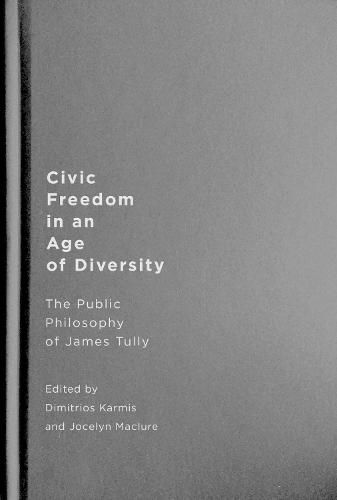Readings Newsletter
Become a Readings Member to make your shopping experience even easier.
Sign in or sign up for free!
You’re not far away from qualifying for FREE standard shipping within Australia
You’ve qualified for FREE standard shipping within Australia
The cart is loading…






This title is printed to order. This book may have been self-published. If so, we cannot guarantee the quality of the content. In the main most books will have gone through the editing process however some may not. We therefore suggest that you be aware of this before ordering this book. If in doubt check either the author or publisher’s details as we are unable to accept any returns unless they are faulty. Please contact us if you have any questions.
James Tully is one of the world’s most influential political philosophers at work today. Over the past thirty years - first with Strange Multiplicity (1995), and more fully with Public Philosophy in a New Key (2008) and On Global Citizenship (2014) - Tully has developed a distinctive approach to the study of political philosophy, democracy, and active citizenship for a deeply diverse world and a de-imperializing age.
Civic Freedom in an Age of Diversity explores, elucidates, and questions Tully’s innovative approach, methods, and concepts, providing both a critical assessment of Tully’s public philosophy and an exemplification of the dialogues of reciprocal elucidation that are central to Tully’s approach. Since the role of public philosophy is to address public affairs, the contributors consider public philosophy in the context of pressing issues and recent civic struggles such as: crises of democracy and citizenship in the Western world; global citizenship; civil disobedience and non-violence; Indigenous self-determination; nationalism and federalism in multinational states; protest movements in Turkey and Quebec; supranational belonging in the European Union; struggles over equity in academia; and environmental decontamination, decolonization, and cultural restoration in Akwesasne.
Offering a wide-ranging analytical discussion of Tully’s work by leading scholars from various fields of study, with an extensive reply by Tully himself, Civic Freedom in an Age of Diversity provides a rich perspective on the full extent of his contribution.
$9.00 standard shipping within Australia
FREE standard shipping within Australia for orders over $100.00
Express & International shipping calculated at checkout
This title is printed to order. This book may have been self-published. If so, we cannot guarantee the quality of the content. In the main most books will have gone through the editing process however some may not. We therefore suggest that you be aware of this before ordering this book. If in doubt check either the author or publisher’s details as we are unable to accept any returns unless they are faulty. Please contact us if you have any questions.
James Tully is one of the world’s most influential political philosophers at work today. Over the past thirty years - first with Strange Multiplicity (1995), and more fully with Public Philosophy in a New Key (2008) and On Global Citizenship (2014) - Tully has developed a distinctive approach to the study of political philosophy, democracy, and active citizenship for a deeply diverse world and a de-imperializing age.
Civic Freedom in an Age of Diversity explores, elucidates, and questions Tully’s innovative approach, methods, and concepts, providing both a critical assessment of Tully’s public philosophy and an exemplification of the dialogues of reciprocal elucidation that are central to Tully’s approach. Since the role of public philosophy is to address public affairs, the contributors consider public philosophy in the context of pressing issues and recent civic struggles such as: crises of democracy and citizenship in the Western world; global citizenship; civil disobedience and non-violence; Indigenous self-determination; nationalism and federalism in multinational states; protest movements in Turkey and Quebec; supranational belonging in the European Union; struggles over equity in academia; and environmental decontamination, decolonization, and cultural restoration in Akwesasne.
Offering a wide-ranging analytical discussion of Tully’s work by leading scholars from various fields of study, with an extensive reply by Tully himself, Civic Freedom in an Age of Diversity provides a rich perspective on the full extent of his contribution.